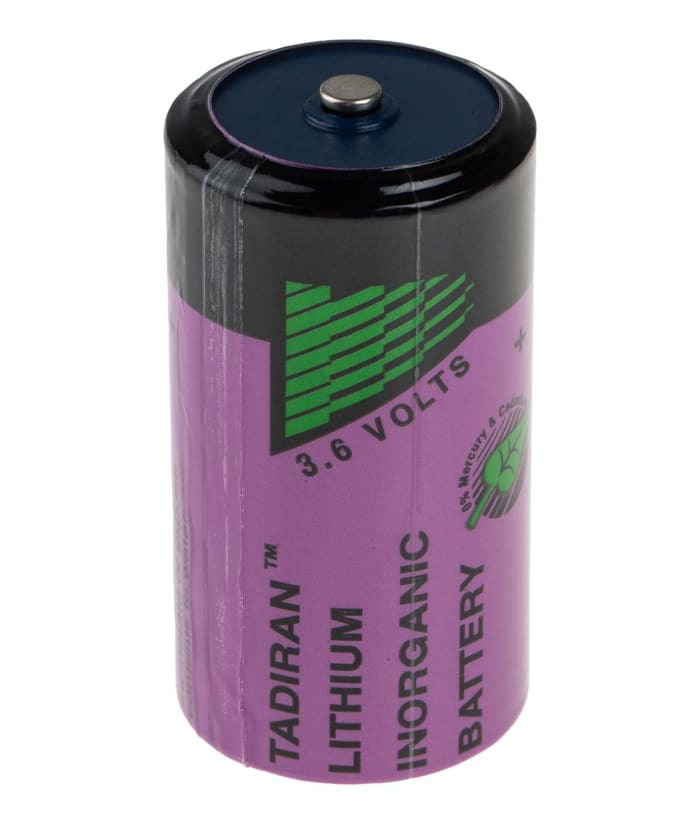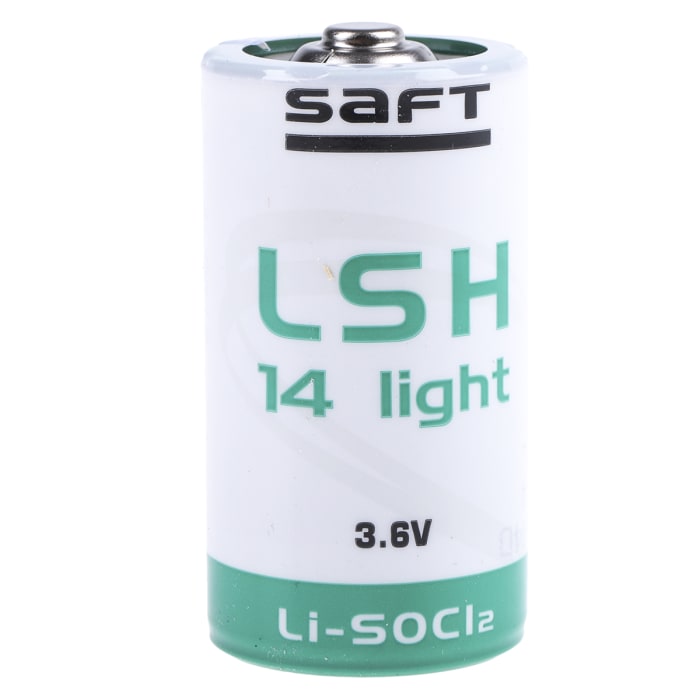Technical documents
Specifications
Brand
SaftChemistry
Lithium Thionyl Chloride
Size
C
Nominal Voltage
3.6V
Terminal Type
Standard
Capacity
7.7Ah
Country of Origin
France
Product details
Lithium Thionyl Chloride Batteries
A 3.6V Primary Lithium Thionyl Chloride (Li-SOCl₂) from Saft. This battery is a non-standard sizes battery designed for reliability in specialist applications such as measuring devices, alarms and safety equipment, emergency transmitters, backup systems or real-time clocks. With an operating range from -60°C to 85°, C and resistance to wet environments are suitable to be used indoor and outdoor. They provide the high-performance and longer lasting life.
Features and benefits:
• High voltage response, stable during most of the lifetime of the application
• Low self-discharge rate (less than 1 % per year of storage at +20°C)
• Ease of use
• Non-flammable electrolyte
• All cells are hermetically sealed in stainless steel cans (low magnetic signature and superior resistance to atmospheric corrosion)
• Wide operating temperature range (from -60°C to 85°)
• Long storage and operational life
Typical Applications:
Primary Lithium Thionyl Chloride speciality size batteries are used in electronic devices that require a small, compact source of power. Example applications include:
• Emergency Transmitters
• Alarms and Safety Equipment
• Measuring Instruments
• Real-Time Clocks
• Backup Systems
• Tracking Systems
• Automotive Electronics
• Professional Electronics
FAQ’s
•Are Lithium Thionyl Chloride Batteries Harmful? - Lithium Thionyl Chloride batteries can sometimes leak a substance called potassium hydroxide which is a caustic agent that can cause eye, skin and respiratory irritations. This risk is reduced by not mixing different manufacturer battery types, batteries of different chemistries and by the replacement of all batteries at the same time.
•How to dispose of Lithium Thionyl Chloride Batteries? -Recycle responsibly, a wide range of schemes are available.
Safety Advice
• Keep out of sight and reach of children.
• Fire, explosion and burn hazard - Do not recharge, short circuit, crush, disassemble, heat above 100゚C (212゚F), incinerate
• Due to the high terminal voltage (3.6V), they are not suitable as direct replacements for other battery technologies in the same can sizes.
Guidance:
• Always install the batteries correctly as per instruction
• Ensure that the contact points are clean and conductive
• Do not mix different types of battery
• Do not heat or attempt to recharge the battery
• Do not dispose of in a fire
€ 45.74
€ 45.74 Each (ex VAT)
1
Please note: Hazardous items will incur an additional delivery charge and have a much longer lead time. Please contact us for further details.
€ 45.74
€ 45.74 Each (ex VAT)
Stock information temporarily unavailable.
1
Please note: Hazardous items will incur an additional delivery charge and have a much longer lead time. Please contact us for further details.
Stock information temporarily unavailable.
Technical documents
Specifications
Brand
SaftChemistry
Lithium Thionyl Chloride
Size
C
Nominal Voltage
3.6V
Terminal Type
Standard
Capacity
7.7Ah
Country of Origin
France
Product details
Lithium Thionyl Chloride Batteries
A 3.6V Primary Lithium Thionyl Chloride (Li-SOCl₂) from Saft. This battery is a non-standard sizes battery designed for reliability in specialist applications such as measuring devices, alarms and safety equipment, emergency transmitters, backup systems or real-time clocks. With an operating range from -60°C to 85°, C and resistance to wet environments are suitable to be used indoor and outdoor. They provide the high-performance and longer lasting life.
Features and benefits:
• High voltage response, stable during most of the lifetime of the application
• Low self-discharge rate (less than 1 % per year of storage at +20°C)
• Ease of use
• Non-flammable electrolyte
• All cells are hermetically sealed in stainless steel cans (low magnetic signature and superior resistance to atmospheric corrosion)
• Wide operating temperature range (from -60°C to 85°)
• Long storage and operational life
Typical Applications:
Primary Lithium Thionyl Chloride speciality size batteries are used in electronic devices that require a small, compact source of power. Example applications include:
• Emergency Transmitters
• Alarms and Safety Equipment
• Measuring Instruments
• Real-Time Clocks
• Backup Systems
• Tracking Systems
• Automotive Electronics
• Professional Electronics
FAQ’s
•Are Lithium Thionyl Chloride Batteries Harmful? - Lithium Thionyl Chloride batteries can sometimes leak a substance called potassium hydroxide which is a caustic agent that can cause eye, skin and respiratory irritations. This risk is reduced by not mixing different manufacturer battery types, batteries of different chemistries and by the replacement of all batteries at the same time.
•How to dispose of Lithium Thionyl Chloride Batteries? -Recycle responsibly, a wide range of schemes are available.
Safety Advice
• Keep out of sight and reach of children.
• Fire, explosion and burn hazard - Do not recharge, short circuit, crush, disassemble, heat above 100゚C (212゚F), incinerate
• Due to the high terminal voltage (3.6V), they are not suitable as direct replacements for other battery technologies in the same can sizes.
Guidance:
• Always install the batteries correctly as per instruction
• Ensure that the contact points are clean and conductive
• Do not mix different types of battery
• Do not heat or attempt to recharge the battery
• Do not dispose of in a fire



